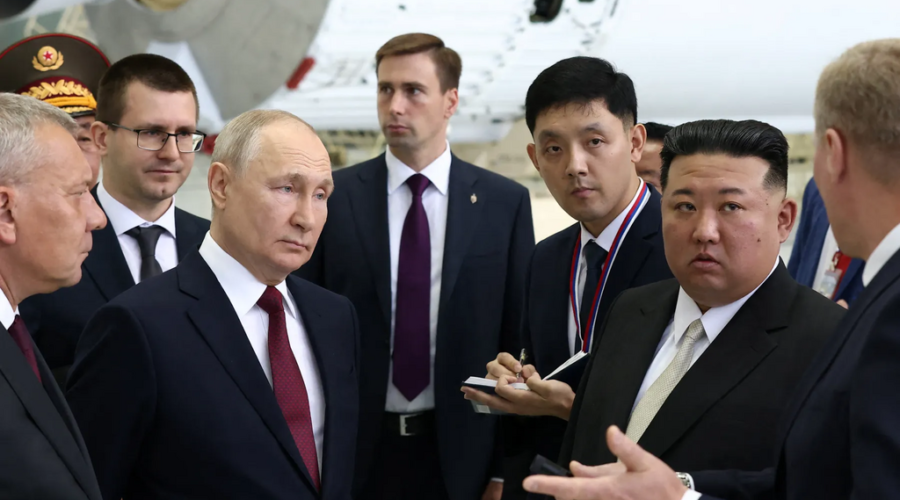Unlike Ukraine, which is firmly backed by NATO, Russia cannot count on its nominal Collective Security Treaty Organization (CSTO) allies’ support. In an attempt to preserve the status quo on the ground in southeastern Ukraine, the Kremlin seeks to strengthen military cooperation with North Korea – a country that has large artillery and other weapons stockpiles that the Russian military desperately needs.
On September 17, North Korean leader Kim Jong Un ended his six-day trip to Russia, where he met with the country’s officials, including President Vladimir Putin and Defense Minister Sergei Shoigu. Kim openly supported Putin, claiming that “the Democratic People’s Republic of Korea (DPRK) and the Russian Federation will be together in the fight against imperialism”. Such rhetoric indicates that the Kremlin can count on political, military and economic cooperation with Pyongyang.
The North Korean “dear leader” also visited several Russian military and technology sites, which suggests that he might be interested in space launch technology, as well as in the development of military reconnaissance satellites. Moreover, Pyongyang is likely seeking to modernize North Korea’s outdated air force, and also to develop economic cooperation with Russia.
It is a well-known fact that many North Koreans travel to the Russian Far Eastern city of Vladivostok to earn a living. In 2017, some 32,000 North Korean migrants worked in Russia. According to reports, more than 85 percent of them worked in construction, although rumors were flying that they were treated like slaves. But following the UN sanctions – imposed on Pyongyang in September 2017 over North Korea’s nuclear program – the majority have been forced to leave. At the time, Russia aimed to demonstrate to the West that it complies with the restrictions prohibiting the employment of North Koreans.
But now that the West has imposed sanctions on Moscow over its actions in Ukraine, the Kremlin could allow North Korean migrants to return to Russia. In August 2022, Russian authorities said that North Korean laborers could take part in the reconstruction of the Donbass, while Putin’s spokesman Dmitry Peskov emphasized on September 7 that Russia plans to develop its relations with North Korea “regardless of what other countries might think.”
Thus, it is entirely possible that North Korean workers will soon join Central Asian migrants who have been hired by Russian firms to work in Russian-controlled Ukrainian territory. The fact that Kim visited several Russian food enterprises suggests that Moscow might eventually start supplying Pyongyang with food. Such an action could help the most isolated country in the world to at least partially resolve food shortages. The Kremlin, for its part, would undoubtedly seek to get the access to the North Korean highly-regulated market.
The political philosophy known as juche is the official state ideology of the Democratic People’s Republic of Korea. Its core idea is that the country must stay dependent solely on its own strength. In reality, however, North Korea needs Russian food and satellite technology, while the Kremlin needs North Korean cheap labor, weapons and ammunition. More importantly, Moscow likely expects Kim to raise tensions on the Korean Peninsula aiming to limit South Korean arm supplies to Ukraine.
Since Seoul is an important arm supplier to Kyiv, it is not surprising that its archenemy openly supports Russian invasion of Ukraine. Given that, prior to Kim’s trip to Russia, a group of Chinese bloggers visited Russian-controlled city of Mariupol in the Donbass, it is very probable that North Korean “dear leader” got the green light from Beijing – its nominal ally – to develop (at least to a certain extent) military ties with Moscow. That, however, does not mean that North Korea will send its troops to fight on the Russia side in Ukraine, although it is expected to start providing Russia with artillery rounds. DPRK is believed to have large stockpile of ammunition and rockets that would be compatible with Soviet-era weapons.
It is not a secret that the Russian defense industry remains heavily dependent on parts and components imported from the West. It is, therefore, no wonder that, despite claims of self-sufficiency, Russia cannot produce enough weapons and ammunition itself, but relies on support from countries like North Korea and Iran, while its CSTO allies continue distancing themselves from the Kremlin.
But Russian potential access to DPKR’s stocks is unlikely to change the outcome of the war, even if Russia buys millions of artillery shells and rockets from Pyongyang. It can, however, prolong the conflict, and help Moscow preserve control over the territories it occupied. Still, at this point it remains highly uncertain when the two countries will launch a military cooperation, considering that, according to the Kremlin, they did not sign any agreements.
Since Moscow seems to enjoy creating an illusion that it never violates any international agreements or UN sanctions, it will almost certainly publicly deny its military ties with Pyongyang. Such a strategy, however, is unlikely to prevent the West from imposing new sanctions on both Russia and North Korea.
In the foreseeable future, the two neighboring countries are expected to deepen their cooperation within the “Axis of the Sanctioned”.
Image: Artem Geodakyan/Sputnik, Pool via Reuters

